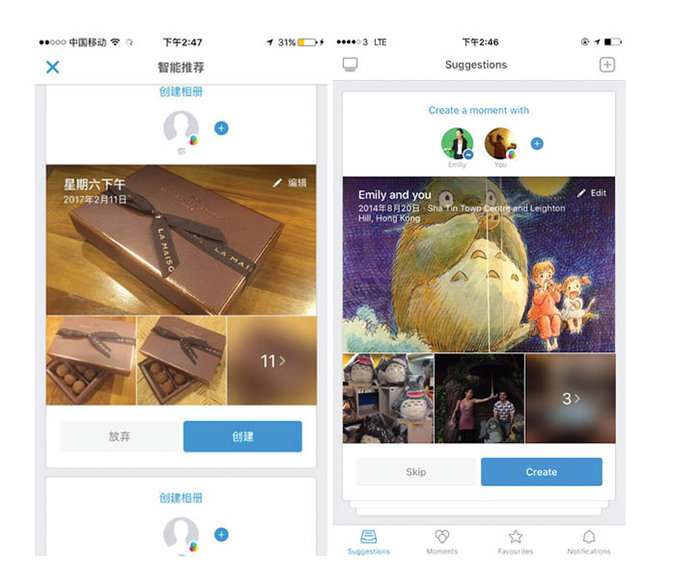Facebook secretly released an application in China through a front company

Mark Zuckerberg jogging in Tiananmen Square in downtown Beijing in 2016. Photo: Facebook, via Agence France-Presse - Getty Images
The Facebook site and many applications of this company have long been blocked in China. The social network itself was blocked in 2009, Instagram - in 2014, and WatsApp partially blocked in July 2017. To change the situation, Mark Zuckerberg met with the Chinese president, chief Internet official and other politicians, defiantly read Chinese communist propaganda , studied Mandarin Chinese, and even spoke publicly in that language for 22 minutes .
Nothing helped.
')
Now Facebook is trying to tricky way around the Great Chinese firewall.
In May 2017, Facebook approved the launch in China of the Colorful Balloons mobile application, which is almost an exact replica of the Facebook Moments branded app for sharing photos from a smartphone. But if all over the world Moments connects users through Facebook, then Colorful Balloons works through the Chinese social network WeChat using QR codes.
The application was released through a local front company, which formally has nothing to do with Facebook, a source aware of the company's plans, but who wished to remain anonymous due to the confidential nature of the information, told The New York Times .
Judging by the description in the Chinese App Store, the developer of the application is the company Youge Internet Technology with the legal address in the eastern part of Beijing, on the fourth floor of one of the office buildings (the NYT editors could not find the office number specified in the company's registration documents). The executive director named a woman named Zhang Jingmei, who was recently seen at an important meeting between Facebook representatives and the Shanghai administration (in the photo she sits next to Wang-Lee Moser, Facebook's top manager for relations with the Chinese government). This indicates the high status of Zhang Jingmei and the credibility of her leadership of Facebook.
The secret and anonymous release of the application in China by a major American technology company is an unprecedented case, according to NYT. According to the publication, this “shows the level of despair and disappointment” of Western IT companies, which unsuccessfully try to break into the world's largest Internet market with 700 million users and e-commerce turnover of $ 750 billion a year. Gradually, everyone understands that China is a special place, and it will not be possible to work here by generally accepted civilized methods.

Comparison of the programs Colorful Balloons app (left) and Moments (right)

Comparison of the programs Colorful Balloons app (left) and Moments (right)
In May 2017, a new cybersecurity law against foreign Internet companies entered into force in China. The law requires companies to store data in China and provides for “security checks” among companies in a number of sectors. Users of online instant messengers are required to register under their real names. All this is done under the pretext of protection against cyber attacks and terrorism. The law declares the intention to control and protect the “critical information infrastructure,” although protection measures and the subjects of this infrastructure are not clearly spelled out. In many ways, the repressive Chinese legislation is duplicated with the latest laws adopted in Russia, which also declare the fight against anonymization services, require data storage in the territory of the Russian Federation and declare their intention to protect the “critical information infrastructure”.
Perhaps the Trojan release of the Colorful Balloons app in China is a touchstone, a peculiar Facebook experiment. The company wants to test new methods of work in the market with draconian security legislation, if it is impossible to work with civilized methods.
Until now, it has not been known whether the Chinese regulators and censors are aware of the Facebook application’s withdrawal through the front company (after the NYT article, they are certainly aware). But it is quite possible that they could close their eyes to this, if the Chinese developer company is really not formally connected to Facebook. In general, in the App Store and Google Play, as well as Chinese application catalogs, there are a lot of Chinese handicrafts that clone famous and popular Western applications. This program looks like one of these clones - and who will prove the opposite?
On the other hand, after such deceptive maneuvers, Facebook may have new complications in negotiations with the Chinese side on all issues. This is not so much a question of business as a political issue. Having released a Trojan application through a front company, Facebook has acted very risky, and it risks undermining the confidence of the company from the leadership of the Chinese Communist Party, if such trust existed at all. And if it was not, then Facebook does not risk anything. In the end, let the Chinese now try to find a justification for blocking this application or try to prove the involvement of Facebook.
Source: https://habr.com/ru/post/373713/
All Articles